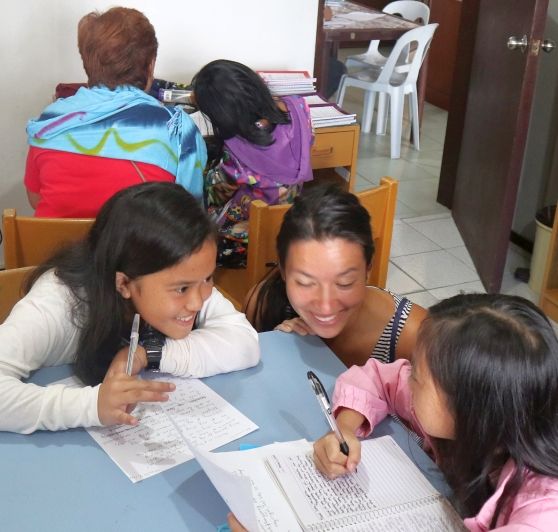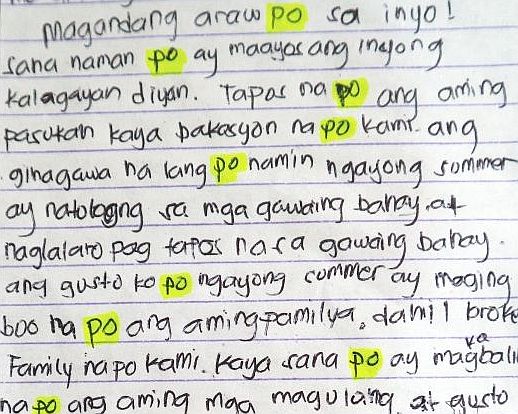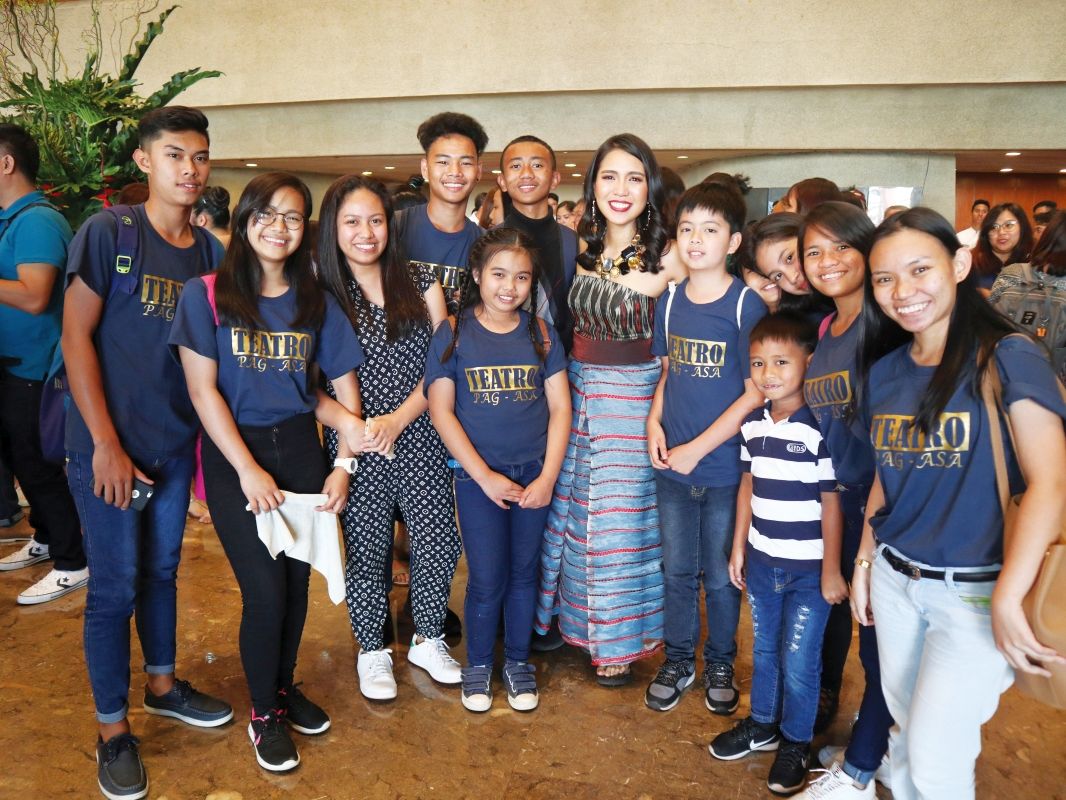Digging into the children’s letters (Part 1)
Dear friends,
Starting with this issue, I am writing to you about more personal topics that concern you and the child or project that you are supporting. The regular and occasional activities that you usually read in the past will be posted instead on our website as there is more space there where you can enjoy more photos too.
Moving forward, how is your vacation going? Have you already gone to the beach or climbed up a mountain? Or did you just stay at home this time reading “your” child’s letter or writing one for him/her? Or did you already send a letter for “your” child and waiting for an answer
Talking about letters, in one way or another, you, the child, and Pag-asa may feel like we are shouting into a void. We put our letter out into the universe and hope for a timely response. There are times we are also slowpokes or worse fall constantly busy that perhaps we already make each other feel not important by not writing back on time.
While we don’t want to make you feel not important when we do not respond immediately, the cause of delay from Pag-asa is that there are times when the child who was scheduled to write, suddenly has school commitments that they needed to attend to or it so happened that the child went for a vacation to a nearby province, or something bad happened in the family (like someone getting sick or having an accident). There are also times when there are no available translators.
Digging deeper into the child’s letter, we also want to take this opportunity to ask for your understanding if there are times when the child or our translator misspelled your name. This happens mostly to European sponsors. We Filipinos are not used to European names. Yes, it is basic, but I can’t tell you how many letters I have already corrected for Guiseppe or Giusepe – and when I do, I find myself instantly annoyed thinking that this child has been writing to Giuseppe two times each year for many years now and yet this child could still not write it correctly. But misspelling does not end in writing your name though. Our translators get sad seeing that many children could not spell correctly anymore both in Filipino and English. I want to stay optimistic and pretend that they are just doing that on purpose to be “in”, otherwise our language is doomed.
In their attempt to shorten text messages on mobile phones, the children have transformed it into a unique language that produces new words and phrases by intentionally threading together misspelled words without syntax and abundantly pinching them with punctuation marks, thus making words longer than the originals. For example, instead of spelling “hello”, most of them spell it as “Eowwwh”.
I know that there are no definite rules in the constantly evolving misspelling, which perhaps adds to its appeal for children and to the confusion of adults. Besides, some children find it as an important part of their lifestyle because it allows them to talk with friends using coded messages beyond the comprehension of their strict parents. This reminds me of the time I learned writing in shorthand and used it to my advantage.
It is a fact that languages had always evolved, with many of the world’s tongues constantly borrowing from one another. The history of language has seen new forms of expression, and using altered words in text messages is acceptable as long as people still use formal language in letter-writing. There is no shame in using such new words in social media, but for the young ones who have not been exposed to proper English and Filipino, this will not give them the right foundation. The long-term effect could prove impoverish to their knowledge of grammar, and may prevent them from landing into good jobs in the future.
It is not a problem that exists only in Pag-asa. This has in fact triggered enormous social debate, with the government even declaring an “all-out war” many years ago against this cyber-dialect. The Catholic Church however, defends that this is also a form of free expression of experience, saying that what is more important are the values behind it.
On a brighter side, we Filipinos can show our respect even in writing by using the word “po”.
We Filipinos have a very different way of behaving and saying things and I think it is necessary that we clarify things on how we behave and say things in the Philippines. When the children write you a letter, you may find it very casual but the truth is, they are very respectful. If you check their letters to you, you will always find the word “po”, at times even repeatedly. It has no meaning on its own, it is simply added to make a sentence more polite-sounding. It is impossible to translate it in other languages.
One very good example of this is when sending a text message to a friend or someone his/her age, the child would write “Okay lang ako”, it would mean “I am doing fine”. When sending a text message to elders or someone of naturally higher standing that he/she want/need to show respect to, the child would write: “Okay lang po ako”, which when translated would be the same as the friendly one “I am doing fine” when in fact what he/she is actually writing is “I would like to RESPECTFULLY inform you that I am doing fine”. “Po” is a way of expressing respect or esteem, whether spoken or written. From the letters you can almost “hear” their respectful gratitude.
Dear friends, I am well aware that not all of you are writing to “your” child. I am not sure though if it is because you find it difficult to start a relationship with “your” child through letter-writing but I guess playing to you and “your” child’s personality or HOT BUTTONS would help. For example, a child who wrote that he/she received an award from school will be very happy to read your acknowledgment of how good he or she is. What do you think?
Here’s wishing you a wonderful and meaningful summer vacation!
Heero Cayasa and your Pag-asa family
PS: If you want to write to your child, please use the following address:
Pag-asa Social Center c/o Arlyn Laroya
P.O. Box #78, 4120 Tagaytay City, Philippines
Or email us:
pagasacenter@yahoo.com
info@pagasasocialcenter.org
If you do not have the possibility to continue to help the child, it is essential to communicate it. The notification must arrive promptly at our office in Tagaytay. This gesture will allow us to continue to help the child looking for another supporter. We thank you in advance for your cooperation.



